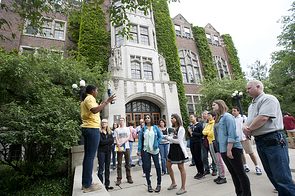
5 Things First-Generation Parents Should Know About College
Filed In
- Navigating Financial Aid
Topics
- Parents
Update, June 2016: As the school year comes to an end and summer kicks off, first-generation college students and their parents are facing an exciting, uncertain future in the fall. Here are a few things families should know about the transition when their child leaves for the first time.
For parents of first-generation college students, the summer before your son or daughter leaves can be both exciting and scary. You can take pride in all that your child has accomplished, and how far they’ll go in their education. And there are also certain challenges that are unique to first-generation college families – circumstances that you can help your child turn into successes for college and beyond. Here are five tips to help.
 1. Be prepared for change. As children mature and make their own mark in the world, the move to college often comes along with a newfound sense of adulthood. All young people undergo transformation during their higher education experience—they interact with students from all over the country or the world; they may live away from home for the first time; and they develop their path to a future career.
1. Be prepared for change. As children mature and make their own mark in the world, the move to college often comes along with a newfound sense of adulthood. All young people undergo transformation during their higher education experience—they interact with students from all over the country or the world; they may live away from home for the first time; and they develop their path to a future career.
This transition is especially apparent in first-generation families. The Washington Post published an article this week, providing a look at some of the psychological barriers that a first-generation family can face:
“In families, role assignments about work, family, religion and community are passed down through the generations creating ‘intergenerational continuity.’ When a family member disrupts this system by choosing to attend college, he or she experiences a shift in identity, leading to a sense of loss. Not prepared for this loss, many first-generation students may come to develop two different identities – one for home and another for college.”
While every family will have its own way of dealing with this unique (and often difficult) change, acknowledging and preparing for these challenges can make the transition that much smoother.
2. Know that financial aid is crucial. For many first-generation families, it’s hard to make college decisions when tuition seems too expensive at many schools. That’s when knowing your financial aid options are so important. Here are a few places to start looking:
- Federal Student Aid. This office is part of the U.S. Department of Education, and is the largest provider of student financial aid in the U.S. It’s the same office that offers the Free Application for Federal Student Aid (FAFSA), which your student should file in order to qualify for federal aid. Take a look at this blog post for more information on the FAFSA!
- Scholarships play an important role in helping make college affordable. Many businesses, foundations and other national and local organizations offer awards of all different amounts. National programs tend to offer larger, more lucrative awards. Local programs tend to offer smaller awards, but they often have less competition, and every dollar adds up. We encourage your student to apply for all opportunities they’re eligible for. See resources like ScholarshipAmerica.org and The Scholarship CoachSM on where to find scholarships.
3. Don’t get stopped by price. The cost of college may seem daunting, but we encourage your family not to give up on your options. There are plenty of benefits to earning a college degree, including higher pay and better job prospects. This article explains some of the benefits of attending college from a student perspective. College matters, and can be a life-changing opportunity for your family – and your student’s family!
4. Encourage further research. There are a lot of college possibilities available to your student, ranging from technical schools to private universities, all offering many different kinds of programs. With so many choices, it’s important that you’re invested in your child’s college search. There are professionals who can help, too, including:
- Your student’s high school counselor
- A college’s financial aid officer
- Events like College Goal Sunday, where local volunteers help fill out the FAFSA, and provide information on financial aid
- College websites like the College Affordability and Transparency Center and BigFuture, which can help narrow down schools based on your student’s interests
5. Be assured that your student is not alone. Fortunately, there are also a number of resources available specifically for first-generation students – and the families that support them. Check out these websites:
- FirstGenerationStudent.com: Full of information of how to pay for college, where to apply, how to succeed after college – all for first-generation students
- I’m First!: An online community that includes advice and inspiration for your first-generation college student
- Individual schools: Colleges and universities continue to recognize the need to support first-generation college students, and are providing more online and in-person resources to meet that need. For example, Chapman University has put together tips for first-generation students and parents. Brown University has a similar section, including frequently asked questions about the campus. Many larger campuses will also have first-generation student support groups, providing extra care and attention to those who are new to higher education.
The college experience may not be easy, but is worth it. Take some student inspiration from Michelle Obama, First Lady and first-generation college graduate:
 hbspt.cta.load(241375, 'f9f49695-bf73-4887-bd03-40855c71cdb4', {});
hbspt.cta.load(241375, 'f9f49695-bf73-4887-bd03-40855c71cdb4', {});
Related Articles
Browse All
Our team is here to help you achieve your goals and build your custom scholarship program.

